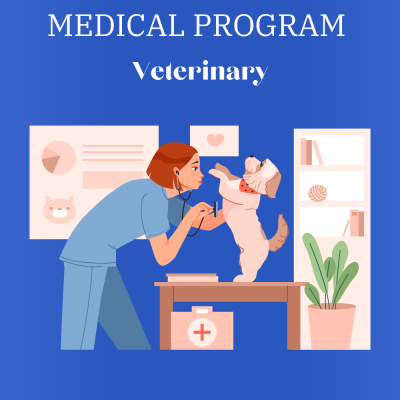

Veterinary Program
Are you enthusiastic about animals and dedicated to their health and well-being? Our Veterinary Programme is designed to prepare you for a rewarding profession as a veterinarian, where you will diagnose, treat, and prevent animal diseases while also promoting animal welfare and public health. Whether you want to work with companion animals, cattle, exotic species, or wildlife, our programme will prepare you with the knowledge, skills, and hands-on experience you need to succeed in veterinary care.
University
40+
Duration
4 to 6 years
Eligibility
Itermediate
Exploring Veterinary Medicine:
Veterinary medicine is a specialised field of medicine that focuses on the diagnosis, treatment, and prevention of diseases and injuries in animals. Veterinarians and veterinary technicians perform critical roles in fostering animal health, welfare, and the human-animal link. In this book, we’ll look at the interesting world of veterinary medicine, including the roles of veterinary professionals, educational pathways, career options, and the value of veterinary care in society.
Course Highlights:
1. Animal Anatomy and Physiology: Investigate the structure and function of animal bodies, such as mammals, birds, reptiles, amphibians, and fish, to better understand the mechanisms of health and disease across species.
3. Preventive Medicine and Public Health: Learn about preventive healthcare practices for animals, such as immunisations, parasite control, nutrition management, and wellness programmes, to maintain animal health and avoid the transmission of zoonotic illnesses
2. Veterinary Medicine and Surgery: Discover how to identify and treat medical ailments in animals, such as infectious diseases, metabolic disorders, musculoskeletal injuries, and reproductive issues, using medical interventions, surgical procedures, and therapeutic treatments.
4. Diagnostic imaging and laboratory techniques: Learn diagnostic imaging procedures such as radiography, ultrasound, and endoscopy, as well as laboratory diagnostic tests including bloodwork, urine, microbiology, and cytology.
5 Animal Behaviour & Welfare: Learn about animal behaviour, cognition, and welfare needs, as well as how to assess and enhance animal well-being in a variety of settings such as veterinary clinics, shelters, and research facilities.
6. Veterinary Ethics and Professionalism: Investigate ethical quandaries and professional duties for veterinarians, such as client confidentiality, informed consent, euthanasia, and ethical issues in research and animal care.
7. Exotic and Wildlife Medicine: Learn about the unique health issues of exotic pets, zoo animals, and wildlife species, as well as how to identify and treat medical conditions in non-traditional animal species.
Career Opportunities:
Veterinary experts can pursue careers in a variety of fields, including:
1. Private Practice: Veterinarians may work in private veterinary clinics, where they treat companion animals, livestock, and exotic pets. Veterinary technicians work alongside veterinarians in clinical settings, helping with patient care and client communication.
2. Veterinary professionals may work at academic research institutes, government agencies, or pharmaceutical firms, doing studies on animal health, biomedical sciences, and veterinary medicine.
3. Veterinarians play an important part in public health programs like disease surveillance, zoonotic disease control, food safety inspections, and environmental monitoring. Veterinary experts can work with government agencies, public health departments, or international organizations.
Duration and Certification:
Our Veterinary Programme normally lasts [length] and includes [number] of academic years or semesters. After successfully completing the programme and meeting all graduation requirements, you will be awarded a Doctor of Veterinary Medicine (DVM) degree or a comparable credential, proving your eligibility to practise as a veterinarian and pursue licensure.
Conclusion
Veterinary medicine is a lucrative and diversified discipline that provides chances for those interested in animal health, welfare, and the human-animal link. Veterinary professionals have an important role in protecting animal health and welfare, promoting public health, and increasing scientific knowledge in veterinary medicine. Whether in clinical practice, research, public health, or industry, veterinary professionals make a tremendous effect on the lives of animals and the communities they serve.
Admission Requirements:
- You need to be 12th grade pass from a recognized board of education.
- Are you ready to start an exciting path towards a career in aviation? To apply for our Veterinary Program, follow the steps below:










Right Location, Affordable Fees And Right Education!

